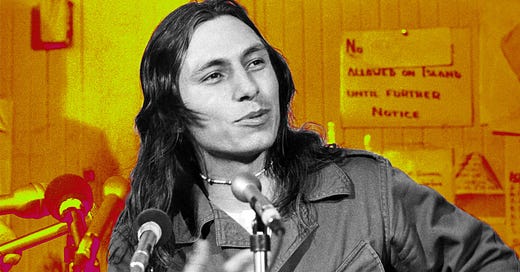The Pirate Radio Broadcaster Who Occupied Alcatraz and Terrified the FBI
Fifty years ago, John Trudell overcame tragedy to become the national voice for Native Americans—and a model for a new generation of activists.
He sat at the same table each evening, sometimes with lighting and sometimes without, a cigarette often in hand, a guest always by his side. In the background, the sound of waves rolling against the rocks and the stuttering of a backup generator were constants. Then, with a crackly yet true radio connection, streaming through the wires from an unthinkable place — Alcatraz Island — he began speaking in a calm, determined voice. The nation was listening.
In the Pacifica Radio Archives, located in a modest brick building in North Hollywood, you can hear what hundreds of thousands of Americans heard on those evenings. File through the cassettes and you will find more than a dozen tapes labeled with a single word: Alcatraz. Each is followed by a date, anywhere from December 1969 to August 1970.
But these were not simply programs about Alcatraz, that island in the notoriously frigid San Francisco Bay that was home to a federal prison until it closed in 1963. Rather, they were broadcast from the former prison building itself, from a small cell without heat and only a lone generator for power rumbling in the background.
The show was called Radio Free Alcatraz, and it was hosted by John Trudell, a Santee Sioux Native American activist and broadcaster.
By the winter of 1969, Trudell could be found in that austere cell, speaking over the rush of waves in a composed Midwestern accent. And by 1973, he had become one of the FBI’s most feared activists, with a file that would eventually run longer than 1,000 pages.
Why would the FBI compose its longest dossier about a broadcaster speaking from a rocky island a mile offshore? What was Trudell saying that frightened them so much?
Trudell was advocating for Native American self-determination, explaining its moral and political importance to all Americans. On air, he often revealed the innumerable ways the government was violating Native American rights: obstructing fishing access in Washington State, setting unfair prices on tribal lands, removing Native American children from local schools. But he didn’t just reveal the cruel contradictions at the heart of American society. He imagined a future in which equality — between different American cultures, and between all people and the earth itself — would become a reality
And for the first time, non–Native American communities were listening. More than 100,000 people tuned in to Pacifica stations in California, Texas and New York to hear his weekly broadcast.
At just 23 years old, with long brown hair and hanging earrings, Trudell had one thing the FBI could not stop: his voice.
Keep reading with a 7-day free trial
Subscribe to Narratively to keep reading this post and get 7 days of free access to the full post archives.




